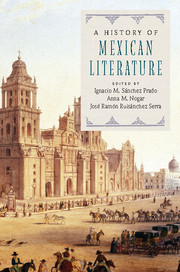Book contents
- Frontmatter
- Contents
- List of contributors
- Introduction
- PART I COLONIAL LITERATURE
- PART II THE NINETEENTH CENTURY
- 9 Early Nineteenth-Century Nation-Building Prose
- 10 The Emergence of the Mexican Literary Field (1833–1869)
- 11 The Rise of Cultural Institutions
- 12 Liberal Literat
- 13 The Conservative Paradigm
- 14 Mexican Modernismo
- PART III TWENTIETH AND TWENTY-FIRST CENTURIES
- PART IV MEXICAN LITERATURE BEYOND BOUNDARIES
- Index
- References
14 - Mexican Modernismo
from PART II - THE NINETEENTH CENTURY
Published online by Cambridge University Press: 05 July 2016
- Frontmatter
- Contents
- List of contributors
- Introduction
- PART I COLONIAL LITERATURE
- PART II THE NINETEENTH CENTURY
- 9 Early Nineteenth-Century Nation-Building Prose
- 10 The Emergence of the Mexican Literary Field (1833–1869)
- 11 The Rise of Cultural Institutions
- 12 Liberal Literat
- 13 The Conservative Paradigm
- 14 Mexican Modernismo
- PART III TWENTIETH AND TWENTY-FIRST CENTURIES
- PART IV MEXICAN LITERATURE BEYOND BOUNDARIES
- Index
- References
Summary
Mexican modernismo cannot be studied without reference to the wider context of Spanish American literature. Roughly spanning the period from 1880 to 1920, Spanish American modernismo precedes the avant-garde movement, which in English has commonly fallen under the general denomination of modernism. However, modernismo, like the avant-garde, is clearly embedded in the episteme of modernity. Self-reflective of its own medium and form, the “semiotic machine” (Jitrik, 1978) of modernismo began to free literary expression from the desire for fixed meaning, giving way to the cutting-edge phase of modernism in the twentieth century. Modernismo came to the fore during a period of far-reaching transformations. These included the final collapse of Spanish colonial rule after the loss of Cuba and Puerto Rico; the launching of Pan-Americanism, signaling the United States’ sphere of influence in Latin America; the advent of political and social movements in the face of capitalist expansion and a laissez-faire economic mentality; the emergent role of Latin America as a producer of raw materials for Europe and as a market for European manufactured products; rural impoverishment as a result of urbanization and geographical mobility; and increasing consumerism as a determining factor in the articulation of social and cultural relations. This latter factor was followed by the impact of science and technology on daily life, the division of intellectual labor – which resulted from the rationale behind the secular order – and the gradual incorporation of literature into an emerging bourgeois market of cultural goods.
In this scenario, literature left behind the undifferentiated domain of civic writing and set in motion an ecumenical imagination based on the idea that Latin American writers, avid and eclectic readers of world literature, were finally becoming participants of a common world culture. Through the study of global networks of cultural exchange, like literary journals, modernismo should be regarded as a complex network of cultural production in constant transatlantic dialogue. In this scenario, modernistas redefined their literary identity by establishing alliances with selected European writers and movements in order to develop a critical understanding of the global scenario (Aching, 1997; Pineda Franco, 2006).
- Type
- Chapter
- Information
- A History of Mexican Literature , pp. 218 - 230Publisher: Cambridge University PressPrint publication year: 2016



